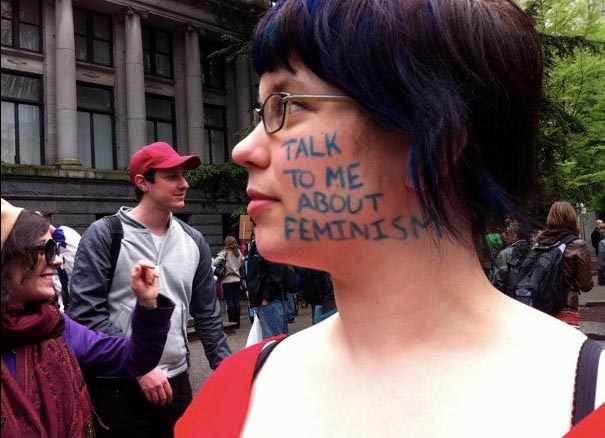rabble.ca is a reader-supported site — we count on donations from people like you. Please join us as a paying member (click here) or send a one-off donation (click here) to help us continue our work.
On Sunday afternoon I joined over 1,000 other women and men to take part in Slutwalk Vancouver.
When the organizers contacted Pivot to speak at the event, I was not very familiar with the story behind Slutwalk. After some research (typing Slutwalk into Google) I learned that it started in response to a police spokesperson who offered the following advice in the wake of a sexual assault: “women should avoid dressing like sluts in order not to be victimized.”
I was intrigued by the idea, largely because whenever I get together with a group of women to talk about violence, inevitably we seem to come back to one common theme — women continue to be held accountable for the violence they have experienced and rather than being supportive, they are held responsible for stopping the abuse. But I was also conflicted.
At an intellectual level, I understand the theory behind of reclaiming language in order to neutralize its power but emotionally, the term “Slutwalk” made me deeply uncomfortable. As I prepared my talk I reflected on my relationship to that particular four-letter word. In the end, I felt compelled to share a story with the crowd of the first time I was ever called a slut.
I was 13 years old and had recently persuaded my parents that I was old enough to walk to the mall by myself. I was basking in the newfound freedom, when some older men started to follow me and ask me my name. I put my head down and sped up, and the situation culminated with them throwing the S-word at me. I felt afraid and confused, but mostly, I felt like had done something wrong and I knew that if my parents found out what had happened, I would never be allowed to go out alone again.
In the 20 years since then, I have heard the word used in attempt to knock women down, to put them in their place and to rob them of their power. We are all impacted by the culture of woman-blaming that Slutwalk is working to deconstruct, but we are not all impacted equally.
At Pivot, we work with a lot of women who are criminalized. Some are criminalized because of involvement in sex work, for others it is because they are struggling with an addiction. Some are criminalized because of their ethnicity or immigration strategy. For most, criminalization is a consequence of extreme poverty and a history of deprivation. For these women, even the most horrific cases of violence are often framed as a consequence of her “lifestyle” or an inevitable aspect of her culture rather than the actions of a male perpetrator.
The most vulnerable women face the greatest barriers in reporting violence and getting support. There is fear of not being believed and of being judged. There is the fear of being charged or brought in on warrants for petty crimes. For some women, there is the very real fear of having their children apprehended or even being reported to immigration officials.
The focus of Slutwalk is sexual violence, but I have found women are held responsible for male violence in almost every situation where they interface with the legal system. It is partially a matter of attitude but in so many cases it is actually institutionalized in law and policy.
Child welfare legislation treats violence against mothers as a safety concern and put responsibility for protecting the children on her. Women are pathologized and offered counseling rather than the safe housing and other supports they need to keep themselves and their children safe.
In family law, the underlying assumption remains that it is in a child’s best interest to have regular contact with both parents. In many cases that means that the woman is held responsible for arranging visits between her children and her abuser. Even no-contact orders meant to protect women from offenders often come with the caveat “except to arrange access for the children.” In the criminal law context, even at the courthouse, few provisions are made to keep women safe before and after an appearance. Women are often characterized as problem witnesses and they do not have access to legal representation.
I am not sure if all language can be reclaimed or neutralized. But seeing so many people — including young men — taking the issue to the streets where it cannot be ignored filled me with hope and deep respect to everyone who brought Slutwalk to Vancouver.
Darcie Bennett is the campaigns director of the Pivot Legal Society, and spoke at Slutwalk Vancouver on May 15, 2011.
Thank you for choosing rabble.ca as an independent media source. We’re a reader-supported site — visited by over 315,000 unique visitors during the election campaign! But we need money to grow. Support us as a paying member (click here) or in making a one-off donation (click here).



